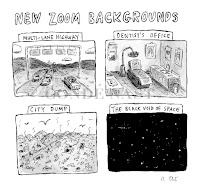Through ten years of being a blogger searching for an audience, I have discovered that if the objective is to get significant readers on platforms like Medium, what works are listicles as clickbait and not my usual attempts. Attempts that are prone to be classified as stabs at reflective writing that usually turns, in the words of a wise friend, "somewhat digressive".
To my mind, however, when it comes to worthwhile writing that creates a body of durable work, listicles might as well rhyme with "pesticles" - a portmanteau of a word signifying a pair of phantom testicles with a pesky itch that never quits.
But then the consumer is king, and I have decided, for just this once, to give it a go, and so here is my attempt at what may be called a listicle.
Everyone wants a 4K TV but do they realize that they, most likely, already have a 4K life? The issue is that they may have a different class of 4K life than the boss in the corner office. A difference akin to that between a 4k cheap, Chinese-branded dumb 4K TV to an Android-driven, shiny new, no-bezel, smart 4K Sony (which, by the way, is also China made but certainly not cheap).
After some research (mainly asking myself probing questions while scratching my "pesticles"), I uncovered 3 types of 4K lives in India. There are many more, of course: some global and some specific to a particular society. I look forward to them being discovered by the countless many who this post will undoubtedly inspire.
Unlike Ekta Kapoor, who misused the letter K for little rhyme or reason, you will discover that my use of the letter, in the subsequent paragraph, is more than justified. Arre bhai, I am writing about 4K lives, am I not?
So here goes.
The Kitsch Klass: Klout, Korruption and Kink
These are the maharajas of excess and bad taste. Their hunting grounds are mainly the worlds of politics and business. They live in expensive monstrosities that can floor you with their ugliness. They gild their interiors and exteriors to hide the rot beneath. And their inferiority complex runs deep, and as it percolates upwards, it becomes a strut of crass behaviour and kooky escapades.
The Khattering Klass: Kocktails, Klub and Kulture
These are representatives of the timeless epithet coined by Spirow Agnew, the much-maligned VP of the equally maligned Richard Nixon: "the nattering nabobs of negativity." In India, while they live off the fat of the land, they let no opportunity to reveal immense dissatisfaction with the state of affairs. They are the self-appointed custodians of the idea of India but ask them to pray, define the concept into words, and all they can do is mumble into their whiskey. A worthy from the current ruling class, who shall remain unidentified, identified them with the venerable watering-hole in Delhi - the Khan Market. That, sir, is a naturally occurring "K" - quite satisfying, I must say. Will the psychosis that this Klass currently suffer be coming to an end once the current dispensation bites, which sooner or later it must, the dust (in other words, mere desh ki mitti.)? Unlikely I would say. They would just go back to cribbing about the heat and, yes, the dust.
The Kommon Klass: Krumpled, Konked and Konfused
What can one say about this class? It is challenging to be flippant about them. They are by far the majority and live lives of deprivations. While the strong arm of the state-controlled by the other classes keeps them in check, they also carry part of the blame for perpetuating the status quo. Many confuse karmic law as a call to inaction and acceptance of fate, while in essence, it is the very opposite. Others fall prey form cultural and religious tribalism, fuelled by vested interests, that blame their conditions on the "other" - the other religion, the other caste, the other nationality, the other kind of skin. It is hard to be flippant about them because they put on no airs. They are a force of nature made prisoner by the pretensions of the more affluent, more powerful classes.
So there! My first attempt at a clickbait! Let's see how many bite.
I do realize though that I did regress back to the mean in the last paragraph. Just like the dog's tail, straight under constraint but finally bent and wagging!







